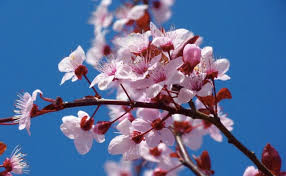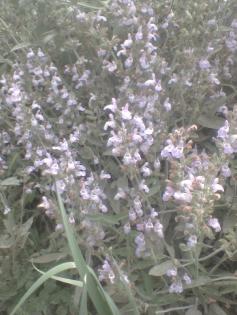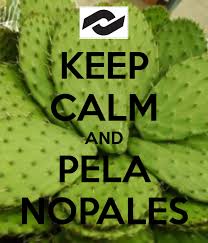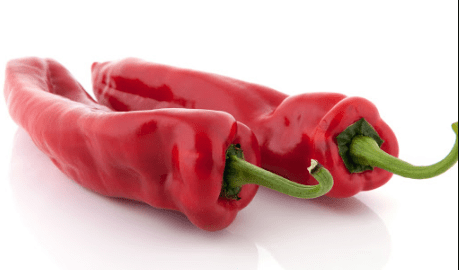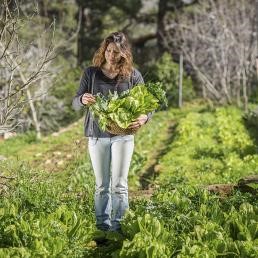Of course, the almond tree is always the first – among the bleak trees that hibernate in the winter cold, naked of fruit and sometimes of leaves, the almond tree is the first to ignite a flare of color, bright flowers on the gray background.
The almond carries the torch that promises it will soon be spring. Shortly after, the other Rosaceae members begin to wake up – the peach, the apricot and the cherry. As if they remind each other to bloom, sakura after a sakura of pink and white blossoms. The blossom of the organic cherry is the shortest of all, and the most dramatic: in the blink of an eye the whole tree is covered with flowers, unlike other trees where the process is much more gradual…
Cherries bloom during the transitional season in organic farming. Some of the winter vegetables begin to step back: the cauliflower, broccoli, cabbage, and kohlrabi. The other greens will soon also start to bow down and be less crunchy, but in the meantime they are still beautiful, tasty and full of vitamins. The cherry likes cold weather, and therefore it is grown somewhat in the Jerusalem mountains, but very common in the north, the Golan Heights and the Western Galilee where it can get the good cold waves, just like it needs (if the tree does not get cold waves, it will not bear fruit). In Israel there are two wild species, the mountain cherry (Prunus prostrata) and the small-fruited cherry (Prunus microcarpa).
The Japanese pay great attention to cherry trees and their sakura, and a great deal of their culture and art is devoted to the tree and the fruit – but the world’s biggest growers and exporters are actually the United States, Turkey and Iran. The cherry is a dioecious tree – that is, each tree has either male flowers or female flowers, not both. The female tree needs to be pollinated by a male tree (using the generous matchmaking services of bees. Cherries are one of the crops that will disappear when the bees become extinct).
Both the sweet (Gudgedan in Israel) and the sour cherries are loaded with vitamins and minerals that do good for the body: iron, calcium, vitamin B, vitamin K, vitamin A, beta carotene, and, of course, as you can guess from its sourness – a significant amount of vitamin C. One of the less common ingredient found in cherries is melatonin – the same substance that helps the body have a good deep sleep, regulate it’s sleep cycles, and avoid jet lag. Therefore, anyone suffering through long nights should drink a glass of cherry juice (the sour ones!) before going to sleep.
The red (and tempting) color of ripe organic cherries indicates the high level of tannins, polyphenols that are also in green tea, red grape skins and pomegranate – a powerful antioxidant that protects the body from the effects of free radicals. Because they also help digesting fat and effectively dissolving them, eating cherries helps lower cholesterol and its associated risks – heart and cardiovascular diseases. Tannins also inhibit the development of cancer cells, especially in the prostate gland and breast tissue. According to Chinese medicine, cherry is used to enhance the vision and the immune systems.
A Spanish folk tale tells us that once upon a time in a distant kingdom there were people who very much loved to eat cherries, and wished the fruit was available for more than only a few weeks a year. Right after picking and enjoying the sweet-sour savory taste – and the season is over (reminds me of the woman who lived in a watermelon). The people decided to consult with their ruler, the almighty omnipotent Sultan, who had a direct contact with the Creator – to demand that there be cherries available all year round, or else!!.
“Look” The Sultan said "The cherry is indeed a perfect fruit, and I too would enjoy eating it all year. The problem is that both the cherry and the Ramadan come from the same source, so if we want to eat cherries throughout the year, we will have to agree that it will be Ramadan all year long." Some would say that the moral of the story is that good things come packaged with the less pleasant things.
I think the moral of the story is – when the cherry season begins, enjoy it as much as you can.
To health!
Yours,
The garden team
We can expect to receive in our organic vegetable baskets (draft only):
Cucumber
Tomato
Lettuce
Potato
Kohlrabi
Zucchini
Pumpkin
Parsley
Swiss chard
In the LARGE vegetable baskets also:
Sweet potatoes
Cilantro
Cabbage
In the organic fruit baskets:
Clementine
Orange
Banana
In the LARGE fruit baskets also:
Sweetie
Grapefruit

